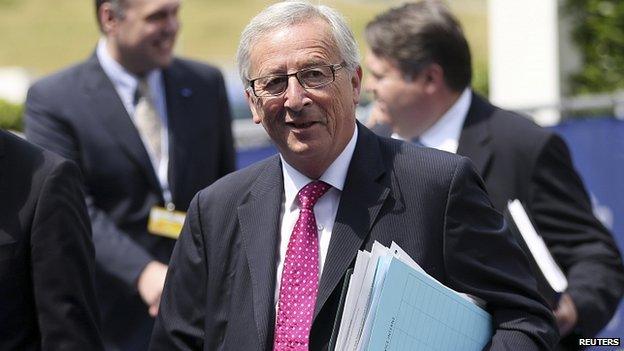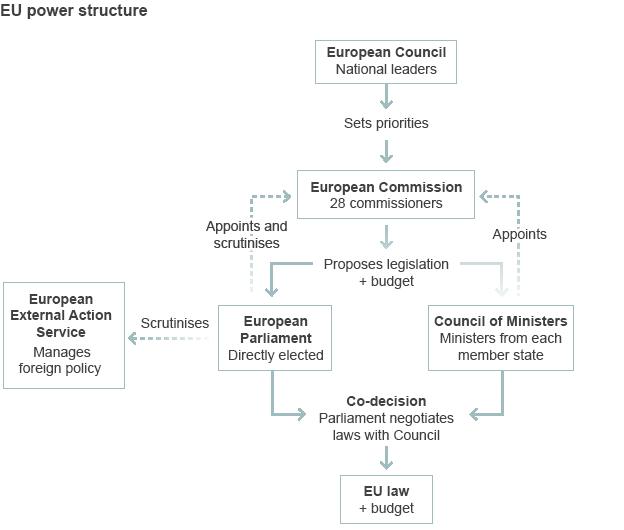EU backs Juncker to head Commission in blow to UK
- Published
- comments
David Cameron: "This is a bad day for Europe"
EU leaders in Brussels have nominated former Luxembourg PM Jean-Claude Juncker to be president of the European Commission, in a blow to the UK.
Prime Minister David Cameron called it "a serious mistake". "This is going to be a long, tough fight," he said.
He had pushed for a vote on Mr Juncker - breaking with tradition - and 26 out of 28 countries backed him.
Only Mr Cameron and Hungarian PM Viktor Orban voted against him. Mr Juncker is also likely to win a vote by Euro MPs.
It is the most powerful job in Brussels - the Commission drafts EU laws, oversees national budgets, enforces EU treaties and negotiates international trade deals.
Mr Cameron believes Mr Juncker is too much in favour of closer political union and might block EU reform.
"This is a bad day for Europe... it hands new power to the European Parliament," Mr Cameron said. "This whole process has simply reinforced my conviction that the EU has to change."
New procedure
Mr Cameron objected to the way Mr Juncker, a 59-year-old veteran of Brussels deal-making, was put forward. He was lead candidate of the centre-right European People's Party (EPP), which won last month's European elections.
"I've told EU leaders they could live to regret the new process for choosing the Commission President," Mr Cameron tweeted, external after the decision.
He told them it was "a sad moment for Europe" and expressed his "disappointment it has reached this point". In the past such appointments were made by the EU leaders - called the European Council - by unanimity.

Jean-Claude Juncker is the choice of the European People's Party, which won the most seats in the European Parliament
After the vote Germany's Chancellor Angela Merkel said there would be a review of how the Commission president was nominated - but only after the new Commission team was in place.
She said Europe was "ready to address British concerns" about its future direction, and that she shared Britain's ideas about what the EU should be like.
The UK Conservatives - who pulled out of the EPP - suspect that the Commission is being politicised in a power grab by the European Parliament. But Mr Juncker's supporters value his record of consensus-building and commitment to EU integration.
Under new EU treaty rules the leaders have to take account of the European election result when nominating a Commission chief. The parliament will vote on Mr Juncker in mid-July.
Mr Cameron's bid to block Mr Juncker suffered a major setback this week when his allies changed tack.
Chancellor Merkel had given Mr Cameron hope after agreeing to a vote on the issue if there was no consensus.
But both the Netherlands and Sweden - normally close to UK positions in Europe - later said they would back Mr Juncker.
Speaking after the summit, Ms Merkel said there had been "no backroom agreement" but "a very good discussion" on Mr Juncker.
In the coming months a new 28-member Commission team - one from each country - will be appointed. The EU will also appoint a new foreign policy chief and new president of the European Council.



The BBC's Chris Morris in Brussels says many European diplomats feel that Mr Cameron's approach in the EU is too confrontational, going against the grain of consensus decision-making in the union.
There is speculation that the UK may get a powerful seat on the Commission as a "consolation prize", he says - for example, commissioner for the internal market.
Mr Cameron wanted a vote on Mr Juncker so that EU leaders would have to justify their support for him in public.
Mr Cameron says he is determined to press ahead with renegotiation of Britain's EU membership, followed by an in-or-out referendum in the UK in 2017, if his Conservative Party wins next year's general election.
But the row over Mr Juncker may make that renegotiation more difficult, observers say.
Last month anti-EU parties made sweeping gains in European elections. They won nearly a third of the parliamentary seats.
In a landmark move on Friday the summit leaders signed far-reaching trade partnership deals with three former Soviet republics - Ukraine, Georgia and Moldova.

Next steps
1-3 July - First post-election session of new European Parliament
14-17 July - European Parliament votes on nominee for Commission president - expected to back Mr Juncker
September - Parliament grills each nominee for 28-member Commission (one from each member state)
October - Parliament votes on new Commission team
November - New Commission should take office, as should new EU foreign policy chief and new European Council president.
